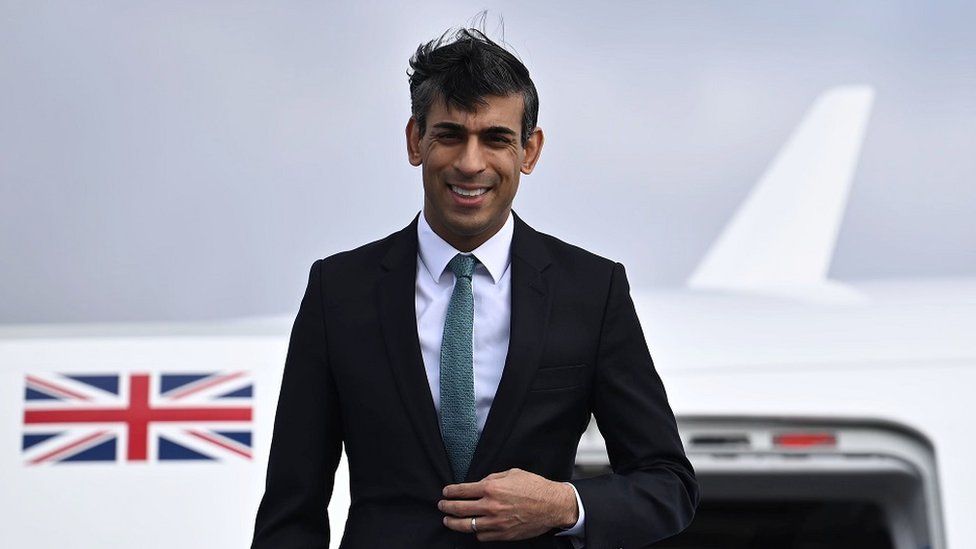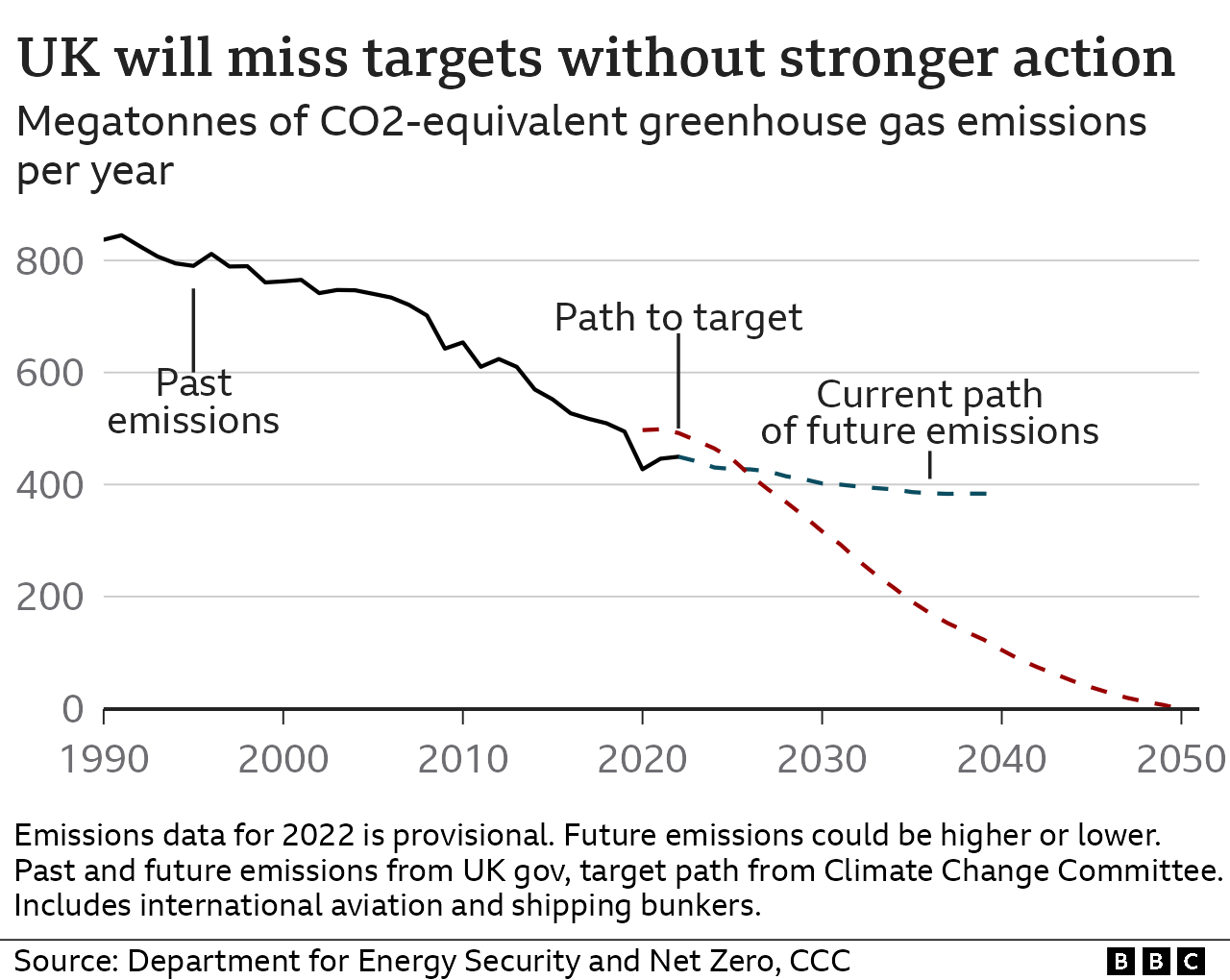Rishi Sunak considers weakening key green policies

Rishi Sunak is considering weakening some of the government’s key green commitments in a major policy shift.
It could include delaying a ban on the sales of new petrol and diesel cars and phasing out gas boilers, multiple sources have told the BBC.
The PM is preparing to set out the changes in a speech in the coming days.
Responding to the reported plans, he said the government was committed to reaching net zero carbon emissions by 2050 but in a “more proportionate way”.
The aim of net zero is for the UK to take out of the atmosphere as many greenhouse gas emissions – such as carbon dioxide – as it puts in.
The prime minister said: “For too many years politicians in governments of all stripes have not been honest about costs and trade-offs. Instead they have taken the easy way out, saying we can have it all.
“This realism doesn’t mean losing our ambition or abandoning our commitments. Far from it.
“I am proud that Britain is leading the world on climate change.”
He said the UK was committed to international climate agreements it had already made.
“No leak will stop me beginning the process of telling the country how and why we need to change,” he said.
Mr Sunak added that he would give a speech later this week “to set out an important long-term decision we need to make so our country becomes the place I know we all want it to be for our children”.
- Chris Mason: Attention-grabbing leak turbocharges climate politics
- Petrol and diesel car ban immovable, says Gove
- What’s net zero – and how does the UK plan to reach it?
If he presses ahead with the plan it would represent a significant shift in the Conservative Party’s approach to net zero policy, as well as establishing a clear dividing line with the Labour Party.
According to multiple sources briefed on Downing Street’s thinking, Mr Sunak would use the speech to hail the UK as a world leader on net zero.
But he would also argue that Britain has over-delivered on confronting climate change and that other countries need to do more to pull their weight.
Some specifics of the speech are still thought to be under discussion, but as it stands it could include as many as seven core policy changes or commitments, documents seen by the BBC suggest.
First, the government would push the ban on the sale of new petrol and diesel cars – currently set to come into force in 2030 – back to 2035. The 2030 date has been government policy since 2020.
Second, the government would significantly weaken the plan to phase out the installation of gas boilers by 2035, saying that they only want 80% to be phased out by that year.
Third, homeowners and landlords would be told that there will be no new energy efficiency regulations on homes. Ministers had been considering imposing fines on landlords who fail to upgrade their properties to a certain level of energy efficiency.
Fourth, the 2026 ban on off-grid oil boilers will be delayed to 2035, with only an 80% phase out target at that date.
In addition, Britons will be told that there will be no new taxes to discourage flying, no government policies to change people’s diets and no measures to encourage carpooling.
Mr Sunak is also likely to rule out what he sees as burdensome recycling schemes.
The government had reportedly been considering a recycling strategy in which households would have had “seven bins” – with six separate recycling bins plus one for general waste.
![Graph showing the current projected future greenhouse gas emissions are some way short of the target path. Greenhouse gas emissions have been falling since 1990. [June 2023]](https://ichef.bbci.co.uk/news/1024/cpsprodpb/B8DF/production/_129972374_emissions_tracker_2022_updated-nc.png)
Labour’s shadow business secretary Jonathan Reynolds said it was “an absolute farce”, with “late night policy statements from the Downing Street bunker, as ever driven by the absolute chaos within the Conservative Party, with a weak Conservative Prime Minister Rishi Sunak”.
He declined to say whether Labour would restore any targets that are ultimately scrapped.
“We are making clear that we are absolutely rejecting this completely futile, short-term and facile way of doing politics,” he said. “This is not a serious way to make long-term decisions that require vast amounts of investments, where lots of jobs are at risk.”
Conservative MP Chris Skidmore, the former chairman of the UK government’s net zero review, said diluting green policies would “cost the UK jobs, inward investment, and future economic growth that could have been ours by committing to the industries of the future”.
“Rishi Sunak still has time to think again and not make the greatest mistake of his premiership, condemning the UK to missing out on what can be the opportunity of the decade to deliver growth, jobs and future prosperity,” he said.
Conservative peer Lord Zac Goldsmith, who resigned as a minister earlier this year with a scathing attack on Mr Sunak’s “apathy” over climate change, said the prime minister was “dismantling” the UK’s credibility on environmental issues.
“His short stint as PM will be remembered as the moment the UK turned its back on the world and on future generations. A moment of shame,” he said.
Green Party MP, Caroline Lucas called any rollback on net zero “economically illiterate, historically inaccurate and environmentally bone-headed”.
But Tory MP Craig Mackinlay, who chairs the net zero scrutiny group, said he was “pleased to see some pragmatism” from Mr Sunak.
Moving back dates for net zero targets “will take pie in the sky ‘greenwash’ measures out of clearly unachievable deadlines”.
Former Conservative minister David Jones said modifying green policies was “inevitable and sensible”, adding that pressing on with the 2030 ban on new petrol and diesel cars would “seriously damage the British motor industry”.
On Thursday, the King will be on a State Visit to France, where he will host what is known as a Climate Mobilisation Forum.
The event convenes specialists in climate finance, and aims to help developing economies make adjustments to cut emissions.
The King will be accompanied by Foreign Secretary James Cleverly.
Related Topics
- Rishi Sunak
- Climate change
- Carbon neutrality
Published at Wed, 20 Sep 2023 02:52:34 +0000
